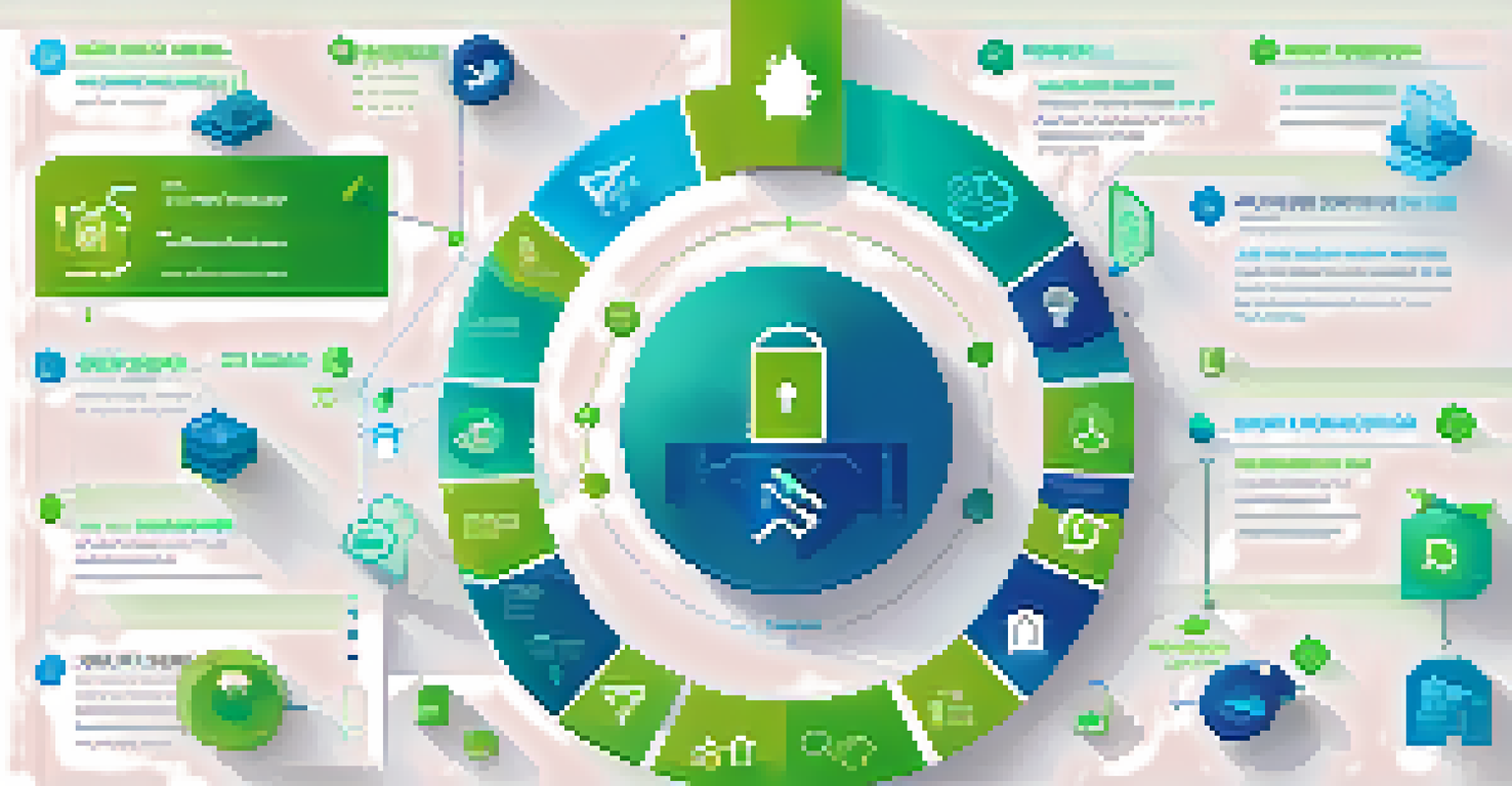Future of Smart Contracts: Predictions for Adoption and Use

Understanding Smart Contracts and Their Benefits
Smart contracts are self-executing contracts with the terms of the agreement directly written into code. This innovation allows for automatic execution without intermediaries, which can significantly reduce costs and increase efficiency. Imagine a vending machine: you insert money, select a product, and the machine delivers it without needing a cashier.
Smart contracts are the digital equivalent of a handshake, but with the reliability of a computer.
The benefits of smart contracts extend beyond cost savings. They offer enhanced security and transparency, as the code is stored on a blockchain, making it tamper-proof. This transparency can build trust among parties involved, as everyone can verify the contract’s terms and execution.
As industries continue to explore the potential of smart contracts, their ability to streamline processes and minimize fraud will likely drive widespread adoption. Businesses that embrace this technology can position themselves at the forefront of innovation.
Current State of Smart Contract Adoption
As of now, various industries are beginning to adopt smart contracts, especially in finance, real estate, and supply chain management. For instance, companies are using smart contracts to automate transactions and ensure timely delivery of goods, reducing the chances of disputes. This gradual adoption showcases the versatility of the technology.

Despite the potential, challenges such as regulatory uncertainty and the need for technical expertise can hinder widespread adoption. Many businesses are still figuring out how to integrate smart contracts into their existing systems, which can be a daunting task. However, as more educational resources and tools become available, these barriers are likely to diminish.
Smart Contracts Enhance Efficiency
Smart contracts automate agreements through code, significantly reducing costs and increasing operational efficiency.
Moreover, the rise of decentralized finance (DeFi) is propelling smart contracts into the spotlight. This segment has gained significant traction, illustrating a growing acceptance of smart contracts in everyday transactions.
Predictions for Future Use Cases of Smart Contracts
Looking ahead, we can expect to see smart contracts used in a myriad of innovative applications. For example, in healthcare, they could streamline patient data management and automate insurance claims, making processes more efficient and less error-prone. This could lead to faster reimbursements and improved patient care.
The future of commerce is not just online; it’s automated, and smart contracts are a key part of that evolution.
Another exciting area is the realm of digital identity. Smart contracts could enable individuals to control their personal data and manage permissions, reducing the risk of identity theft. Just think about how empowering it would be to have full control over who accesses your information and when.
As technology continues to evolve, we might also see smart contracts integrated with the Internet of Things (IoT). This could allow devices to automatically execute contracts based on data collected, leading to enhanced automation in homes and industries alike.
Impact of Regulation on Smart Contract Adoption
Regulation plays a crucial role in the future of smart contracts. Governments worldwide are beginning to recognize the importance of establishing clear legal frameworks to govern the use of blockchain technology. As regulations become more defined, businesses will feel more secure in adopting smart contracts, knowing they are compliant with the law.
However, the regulatory landscape is still evolving, and conflicting regulations across different jurisdictions can complicate matters. For instance, a smart contract executed in one country may not hold the same legal weight in another. This inconsistency could slow down adoption as businesses navigate these complexities.
Regulation Shapes Adoption Landscape
Clear legal frameworks are essential for businesses to confidently adopt smart contracts, but inconsistent regulations can slow progress.
Ultimately, collaborative efforts between regulators and technology developers will be essential. By working together, they can create a balanced regulatory environment that fosters innovation while protecting consumers and businesses alike.
Technological Advancements Driving Smart Contracts
The future of smart contracts is closely tied to advancements in blockchain technology and programming languages. New developments in blockchain scalability and interoperability are crucial for enhancing the performance and usability of smart contracts. As these technologies mature, we can expect to see faster and more efficient contract executions.
Moreover, the emergence of user-friendly platforms for creating and managing smart contracts will lower the barrier to entry for businesses. Just as website builders democratized web development, these platforms will enable more companies to leverage smart contracts without extensive technical knowledge.
In addition, innovations like artificial intelligence (AI) could enhance smart contracts' capabilities. AI could help optimize contract terms based on real-time data, making them even more adaptive and efficient.
Challenges in Implementing Smart Contracts
Despite their potential, the implementation of smart contracts is not without challenges. One significant hurdle is the need for accurate and comprehensive coding. Errors or ambiguities in the code can lead to unintended consequences, making it essential for businesses to invest in skilled developers and thorough testing.
Another challenge is the integration with existing systems. Many organizations have legacy systems that may not easily interface with blockchain technology. Transitioning to a smart contract-based system requires careful planning and execution to avoid disruptions in operations.
Education Drives Smart Contract Growth
Increasing awareness and understanding of smart contracts among businesses and regulators will foster greater adoption and innovation.
Additionally, security concerns remain a priority. While blockchain is inherently secure, vulnerabilities in smart contract code can lead to exploits. Continuous monitoring and improvement of security practices will be vital to ensure the integrity of smart contracts.
The Role of Education in Smart Contract Adoption
Education is a key factor in the widespread adoption of smart contracts. As businesses and individuals become more aware of the benefits and functionalities of smart contracts, their willingness to adopt this technology will likely increase. Workshops, online courses, and informative content can empower stakeholders to make informed decisions.
Moreover, educating regulators about the technology will foster a better understanding of its implications, leading to more informed policymaking. When regulators grasp how smart contracts work, they can create regulations that support innovation while ensuring consumer protection.

Ultimately, creating a culture of continuous learning around blockchain and smart contracts will be essential for the technology's success. As more people become literate in these concepts, the ecosystem will grow, leading to new applications and collaborations.